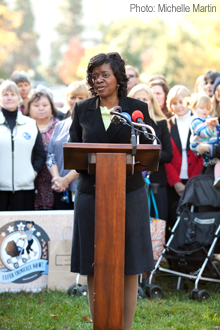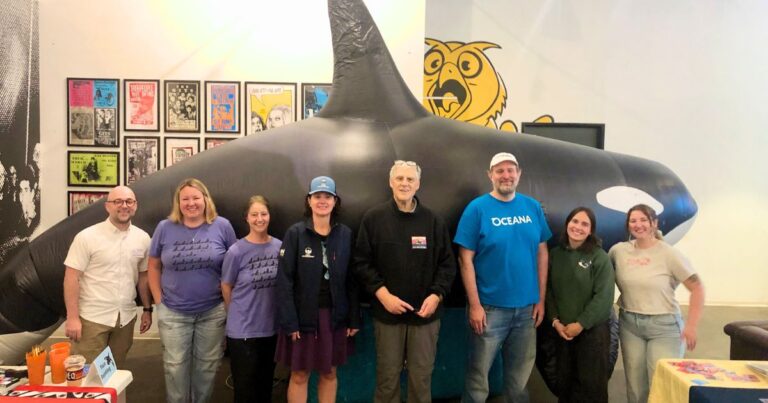Pediatrician Dr. Yolanda Whyte gave this speech to the Stroller Brigade in Washington DC last week.
Hello. My name is Dr. Yolanda Whyte and I am a pediatrician from Atlanta, Georgia and a member of the National Medical Association, the country’s leading professional organization for African American physicians.
I am so grateful to participate in this year’s ‘Stroller Brigade’ because this gives me an opportunity to speak on behalf of the children I work with every day who are vulnerable to the impacts of toxic chemicals.
Babies are exposed to toxic chemicals as they are developing, and from the first moments they enter this world. According to data from the Centers for Disease Control, almost every pregnant woman in the United States has toxic chemicals in her blood.
Children come into contact with a variety of products that may contain harmful chemicals like cribs, mattresses, carpets, sofas toys and plastics. Many of the chemicals they come into contact with have a well-established body of science that shows cause for concern.
There are tens of thousands more chemicals that can be used in consumer products that have not been tested due to our weak, out-of-date federal laws.
Most parents are unaware of the health risks associated with toxic chemicals because there are no warnings, cautions or advisories.
Even as a pediatrician it is hard for me to advise my patients on how and where to avoid toxic chemicals, since our federal laws are so weak.
I am concerned about the care of our children and generations to come. Children have a completely different physiology and metabolism than adults.
They absorb more chemicals through their skin, they breathe in and swallow more toxic chemicals on a body weight basis when compared to their adult parents. Their brain, kidneys and other organs are still developing and are overwhelmed, to the point where even low dose exposures to certain chemicals can have life long consequences.
I am encouraged to see the many health professional organizations that have raised the issue of updating our toxic chemical laws.
The National Medical Association, the American Academy of Pediatrics, American Nurses Association, American Public Health Association and Physicians for Social Responsibility have all spoken out about the need to improve our federal laws on toxic chemicals.
Most recently a joint statement was issued from the American College of Obstetricians and Gynecologists (ACOG) and the American Society of Reproductive Medicine, which raised concerns about our inability to properly advise patients on toxic chemical threats.
The statement even discussed the very important issue about the disproportionate exposures of toxic chemicals in vulnerable populations.
Communities of color, low-income communities living next to industrial or chemical manufacturing facilities, have a higher rate of exposure to toxic chemicals. We must do all we can to protect these hot spot communities and recognize the disproportionate impacts these communities face.
As a pediatrician, I recognize this issue is vast. We’re exposed to chemicals in our products, homes, places of work and in our communities and we need a strong federal system that takes into account all of these exposures and adequately protects our children.
The current bill before the Senate, the Chemical Safety Improvement Act however, does NOT meet the recommendations of the medical organizations I mentioned. And therefore would not, in its current form, provide the basic public health protections that are needed.
I am heartened by the groundswell of support from the medical community on this important issue. I look forward to working with our members of Congress to craft meaningful, real reform of our toxic chemical laws.
Our chemical policies have not been reformed since I was 3 years old. It is now time for us to make sure that our laws and policies are strong enough to protect children and all other vulnerable groups from harm. It’s all about prevention.
If we can prevent exposures to harmful chemicals, we must.
Thank you




